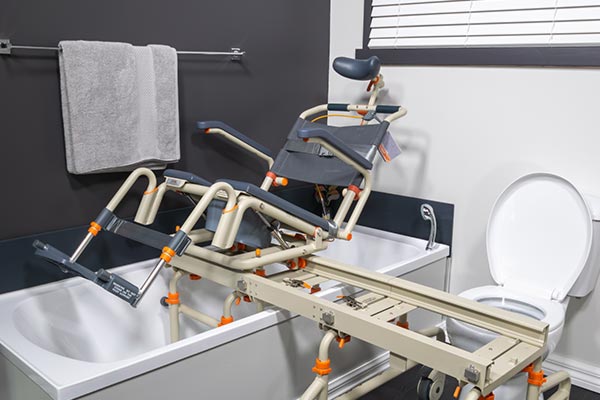-
Teenage life isn’t easy…
-
… anyone over the age of 18 can attest to the fact that your high school years present plenty of uncomfortable or new obstacles. It’s a period where we’re transitioning from child into adult and all the things this comes with from puberty to evolving complex social dynamics. When a teenager also lives with a disability, these experiences can be complicated further. Being ‘different’ is a common source of anxiety for many teens; despite our increasingly inclusive society a mobility impairment that requires a wheelchair will result in at least some sense of difference, whether this is felt internally by your teen, or manifests in how they are included or treated by peers.
Being independent
-
Being a teenager is about independence – don’t forget: to support that
While for many of us the teenage years feel like forever ago, most of us could agree that the last people we felt like listening to between 13-18 were our parents. There’s no difference for kids entering teenagehood with mobility impairment. The challenge here is that for most families, parents are a key role in the day to day support.
-
We’re still responsible for our children as they become teenagers, and the inevitable struggle of trying to guide them properly without hampering their ability to become their own people is one that will never go away.
We work with thousands of Showerbuddy users who are in their teens. And while they have amazing relationships with their parents who’ve supported them through their path, we know that part of their growing up is moving some of their care to independent carers or taking on new responsibilities themselves. Parents need to remember that a disabled teen’s search for ways to become independent shouldn’t be something to worry about, but encouraged in the right ways.
If you can get ahead of this by discussing ways to allow them to control their daily lives more, you’ll both help your teenager find more of a sense of personal identity and probably earn some time back in your own day in the process.
Teenagers in wheelchairs will often become more independent through:
- Using public transport or community transport services.
- Get themselves around school alone.
- Socialise with friends alone.
- Get rides with other (licensed) friends who also help them transport their chair.
- Shop for their own clothes.
- Bathe themselves as much as possible.
Teenage: challenges
-
![]()
-
Challenges a teenager in a wheelchair might face
Thankfully the world’s becoming a far more accessible place. Schools are equipped to cater for wheelchairs and teens have less to worry about when it comes to being out and about in their community. Our younger demographic globally is also significantly more inclusive and understanding of differences, something we see frequently with our teen users’ large networks of peers.
However, the challenges, while maybe not perpetuated consciously by your teen’s year group, may still exist. It’s important that your teen feels comfortable sharing any feelings of isolation of difference and gets the support they need around this. While you may not be who ultimately solves this for them, as a parent you can certainly facilitate them talking to someone about it, whether it’s a friend, therapist or mentor in the community.
Some common challenges that we know the teenage wheelchair community go through:
- Feeling forced to identify as ‘someone in a wheelchair’ instead of their own personality or interests.
- Feeling anxious about making friends.
- Worrying about being excluded from activities due to their mobility impairment.
- Not being able to participate in physical activities like certain team sports.
- Hesitant to pursue relationships.
- Getting tired or exhausted.
- Missing out on certain school events like school hiking/tramping.
It’s important to now minimise these challenges, whilst not allowing them to become self-fulfilling affirmations. As a parent, you’re unlikely to be the voice of reason that gets through to your teen 100% of the time. Rather, you’re better to enlist the help of friends, teachers and therapists to each help in any way they can.
How to make high school life easier in a wheelchair
High school (or ‘secondary school’) brings many new first time experiences, whether that’s exams, learning new subjects or coping with shifting friendship dynamics. Your teen will have to navigate all of this on top of their mobility impairment. This can be tremendously difficult at times, but there are some common tactics that families use to make school life a bit more comfortable:
- Work with the school principal and staff to ensure the campus is fully accessible – that means ramps throughout the common areas, canteen and classrooms, or lifts/elevators in place.
- Build a lesson plan that reduces multiple long distance trips across the campus (this may be down to scheduling which classes are taken where).
- Ensure that your teen has a number of buddies they can check in with (this can be kept private from the rest of the students) for anything they need where a teacher is not nearby.
- Liaise with teachers around the curriculum and any lessons that may require preparation, i.e. science classes outside on the school field. How can your teen access all parts of learning without stress?
- Teach your teen’s close friends how to operate the wheelchair properly, including safety precautions.
- Don’t avoid events like school prom/ball/formals – encourage and enable your son or daughter to enjoy as much of high school as everyone else can.
Extra curricular activities
-
![]()
Engaging with extra curricular activities as: a disabled teen
-
One of the best ways to empower your teen to explore and develop who they are outside of their wheelchair-based daily life is to encourage passions and interests with extra curricular activities.
While some team sports through the school may be impractical, you should talk to the school about options that can accommodate a wheelchair, and tap into local community sports to find wheelchair-based sports.
These are highly popular and your teen will be playing alongside others with a similar degree of mobility as they are. Some sports like wheelchair rugby are highly physical encounters, while a whole host of other sports may also be available. Simply take a look at the paralympics sports list for a flavour of what might be possible for your teen.
Then you’ve got countless creative outlets including drama, painting, learning an instrument or filmography. Few if any of these activities exclude someone with paraplegia.
-
Working as: a team
-
Parents and friends working together to support their loved one
The best dynamic for a teen going through life with a wheelchair is when parents and friends are on the same wavelength and can offer support at any time it’s
needed. Most of the time your teenager will want to talk about anything other than their wheelchair or disability. But in times where they need some help within social occasions, it’s a huge weight off parents’ shoulders when they know their loved one has people watching out for them all the time.Just don’t make the mistake of organising things behind your teen’s back. They must be involved in decision making, and not be made to feel like they don’t have control over their own support network.
-
Your teen’s long term goals
-
Understanding your teenager’s long term goals
Teenagehood is heavily based around transitions, from primary to secondary school, from school to university or a job, and from child to adult. It’s during these 5 or so years that teenagers are being continually asked about their goals after school. Without placing undue pressure on your son or daughter, it’s important to get a gauge on what dreams they have so you can start supporting them to head towards these.
Mobility will be a part of your child’s life forever if they experience a permanent disability. As you support their goals, whether that’s studying at a particular university, or embarking on working in a select field, take the time to learn and find out what’s going to be involved in making that goal an accessible one.
This is a good time to speak with your occupational therapist who knows what’s required to adjust a care plan to adapt to a drastically changing lifestyle while keeping your teen protected in the process.
-
More info
-
More information about this topic:
You can find useful information about this topic across the web via the following excellent online resources:
- A Day in the Life of a Disabled Teenager – The Wheelchair Teen
- What to Know About Living With a Disability – TeenVogue
- Depression: teenagers with disability and chronic conditions – RaisingChildren.net.au
Learn more about Showerbuddy’s range: for disabled teenagers
Showerbuddy provides adaptible solutions for mobility-impaired children. Head over to our petite range page to explore our purpose-built shower chairs.



